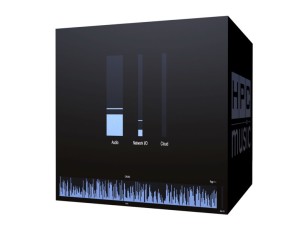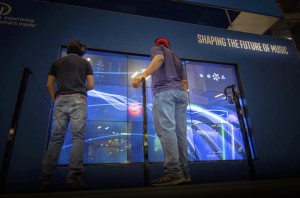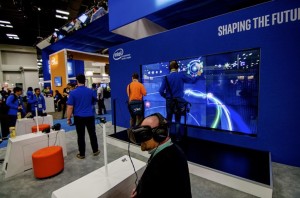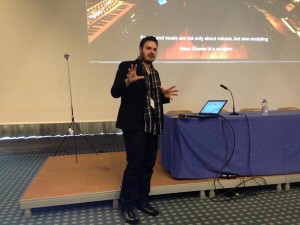In this special guest feature, Jack Rubinger writes that a novel use of high performance computing is transforming the future of music.
Many will be familiar with HPC and industrial or scientific applications, but now HPC is making its impact on something that touches the soul of millions and millions of people every day — music.
In an interview with the inventor of HPC for Music, Antonis Karalis shared a brief explanation of how the future of music has been compromised and what steps are being taken to revolutionize music composition, the creative workflow, and deliver new entertainment experiences.
“Music is presented as a stereo experience from the 70s until today and all the early digital, analog and mechanical tools we use are designed to help us build that ‘interpretation’ of music. Even the music at the cinema is a ‘wide-stereo’ experience 98% of the time, just louder,” said Karalis. But composer and innovator Hans Zimmer and Karalis agree that music was never meant to be a stereo experience — All we have to do is ‘Listen! It’s all around us!’
— Hans Zimmer
Music became a free commodity after the invention of MP3 and the Internet and this is something that cannot be reversed just by introducing monthly subscription streaming. Music is the most advanced form of art. Over the last 50 years we’ve only just scratched the surface of what’s possible.
“To explore that future, we need to rethink everything, starting from the creative side and how we make music, going to the data center and distribution side and all the way up to the audience experience. It has to be a cohesive approach.” said Karalis.
Intel and HPCmusic are using the Intel® Scalable System Framework (Intel® SSF) to set the stage for a transformation of the music industry by tapping into Intel’s high-performance computing expertise. Intel chose the recent SC15 conference to debut three demos that showcase how high-performance computing revolutionizes music and paves the road for the next level of entertainment for the car, the cinema, VR, the home, mobile and video games.
As Diane Bryant, senior vice-president of Intel’s data center group underlined at her SC15 HPCmatters Plenary, HPC transforms and invigorates all the bright young minds to use HPC in ways that were previously unimaginable: “As HPC transforms the science, the science transforms HPC and it propels us forward,” Bryant said.
Everything starts by empowering the creative side. By targeting artists such as Hans Zimmer who has composed the soundtracks for Interstellar and Inception; Perry Farrell; the man behind Lollapalooza, and renaissance man Trent Reznor from Nine Inch Nails, the goal is to reach composers, engineers, producers and musicians with home studios all around the world.
“In two years, you’ll see music technology becoming 35x more affordable than it is today and 300x more powerful. This is just a starting point for Intel® SSF and the HPCmusic® Aural Computing Engine™ (ACE). It is the dawn of a new platform. Digital 2.0 era is here it is only possible using HPC. You’ll see music composers and movie directors working side-by-side in real time virtual environments to create audio-visual experiences that are simply not possible with today’s tools and workflows. You’ll see musicians and arrangers working with instruments that don’t exist in the real world and sound engineers building sound effects based on adaptive-intelligence that completely change the sound of music as we know it.” explained Karalis.
 “When creating music in the analog, mechanical and early digital world, you’re limited by the primitive rules, the bottlenecks and system architectures of those worlds. We’re at the beginning of something that’s not bound by those rules. Intel enable us to push the boundaries of what is possible. I am convinced that the tools we need to invent in order to push music and sound forward can not be invented without HPC,” said Karalis.
“When creating music in the analog, mechanical and early digital world, you’re limited by the primitive rules, the bottlenecks and system architectures of those worlds. We’re at the beginning of something that’s not bound by those rules. Intel enable us to push the boundaries of what is possible. I am convinced that the tools we need to invent in order to push music and sound forward can not be invented without HPC,” said Karalis.
“We are not competing with a Fender guitar, a tube amplifier, a Moog synthesizer or vinyl and the old analog-stereo experience or its modern low quality MP3 incarnation. For us, stereophonic music is a thing of the past. HPC for music makes analog, mechanical, early digital obsolete, along with all the creative tools, workflows and the business models of that era. Creative people all around the world can rethink how they make music and this is what will eventually change the user experience. At the same time, empowered by big data, we make sure that piracy will not cripple the future of music again,” he said.
The new model is going to require high performance computing, the creation of new advanced algorithms based on the HPCmusic’s (ACE) running on Intel® SSF.
“We’re looking at a common set of tools to enable people to create new music technologies and new user experiences,” explained Jon Markee with Intel’s High Performance Computing Division.
Intel® SSF represents a new architectural direction for developing high performance, balanced, power-efficient and reliable systems capable of supporting a wide range of workloads including both compute-intensive and data-intensive workloads.
 Because composing, performing, arranging and distributing music requires both compute-intensive and data-intensive workloads, Intel® SSF is the perfect framework for HPCmusic technologies.
Because composing, performing, arranging and distributing music requires both compute-intensive and data-intensive workloads, Intel® SSF is the perfect framework for HPCmusic technologies.
The three demos at SC15 were led by Antonis Karalis and Panagiotis Kontopoulos of Silicon Valley based HPCmusic. The first demo, the interactive touch-wall, provided a space for visitors to create their own music in a shared compositional environment, underscoring the fact that HPC for music (in the cloud or locally) is an ideal platform for creating advanced virtual creative experiences.
 In the second demo, the virtual reality experience, visitors that were immersed to VR head-sets enjoyed a 4D music experience of the compositions created on the touch wall (demo 1) by means of a custom head-tracking, multi channel, real-time binaural audio processing system. This demonstrated that HPC for music has the power to realize the full potential of sound and music in virtual reality domain.
In the second demo, the virtual reality experience, visitors that were immersed to VR head-sets enjoyed a 4D music experience of the compositions created on the touch wall (demo 1) by means of a custom head-tracking, multi channel, real-time binaural audio processing system. This demonstrated that HPC for music has the power to realize the full potential of sound and music in virtual reality domain.
 After the two interactive experiences, visitors entered the central part of the Intel booth to experience a deep dive into HPC for music. Upon entering the exhibit room, their senses were enlivened by the sound of music like nothing they had ever experienced. Karalis walked them through the creative workflow as well as psychoacoustic, compositional, and computational elements that need to come together in order to create the next level of music experiences. With an understanding of Intel® SSF and HPCmusic’s ACE capabilities, visitors were then introduced to the HPC4D™ four-dimensional sound experience and the emerging HPC audio format engineered for in-car entertainment, VR, home entertainment, mobile, headphones and the next level of the cinematic experience.
After the two interactive experiences, visitors entered the central part of the Intel booth to experience a deep dive into HPC for music. Upon entering the exhibit room, their senses were enlivened by the sound of music like nothing they had ever experienced. Karalis walked them through the creative workflow as well as psychoacoustic, compositional, and computational elements that need to come together in order to create the next level of music experiences. With an understanding of Intel® SSF and HPCmusic’s ACE capabilities, visitors were then introduced to the HPC4D™ four-dimensional sound experience and the emerging HPC audio format engineered for in-car entertainment, VR, home entertainment, mobile, headphones and the next level of the cinematic experience.
 All demos, fully integrated with the four pillars of Intel SSF (compute, storage, fabric and software) were running in real time using HPCmusic’s ACE. Latency on the node level was at the nanoseconds domain, giving a latency on the soundcard output locked below 1ms under any given workload and buffer size scenario. The prototype HPC cluster at the show floor (code name Atlas) was computing on more than 1500 cores (5000 threads) in real time, combining Intel® Xeon Phi™ and future Intel® Xeon® processors, Intel® Omni-Path fabrics, Intel® Optane™ Technology based on 3D XPoint™ non-volatile memory media, Intel® Solutions for Lustre* parallel file system and Intel® Parallel Studios Software Suite.
All demos, fully integrated with the four pillars of Intel SSF (compute, storage, fabric and software) were running in real time using HPCmusic’s ACE. Latency on the node level was at the nanoseconds domain, giving a latency on the soundcard output locked below 1ms under any given workload and buffer size scenario. The prototype HPC cluster at the show floor (code name Atlas) was computing on more than 1500 cores (5000 threads) in real time, combining Intel® Xeon Phi™ and future Intel® Xeon® processors, Intel® Omni-Path fabrics, Intel® Optane™ Technology based on 3D XPoint™ non-volatile memory media, Intel® Solutions for Lustre* parallel file system and Intel® Parallel Studios Software Suite.
Visitors were delighted to experience a typical stereo tune available at online stores today, remixed using 7.1 HPC4D™ sound and compare the two. Outrageous comments poured forth as they noticed the night and day difference.
“When you are going 100% virtual and use HPC for music to power development of new music technologies, disrupt and reinvent the creative workflow and eventually deliver new user experiences, you are entering what I call the Music Technology Singularity. This is the Digital 2.0 era,” explained Karalis.
SC15 brought together the international supercomputing community—an unparalleled ensemble of scientists, engineers, researchers, educators, programmers, system administrators and developers—for an exceptional program of technical papers, informative tutorials, timely research posters and Birds-of-a-Feather sessions.
The team generated interest from South by Southwest and other industry luminaries. These demos showed what you can do with today’s tools and beyond.
“Antonis is driving the music industry in a new direction” said Brock Taylor, an Intel Ecosystem Architect and Engineer. “While HPC is still widely regarded as supercomputing, new genres of applications are emerging that run counterpoint to typical HPC. The goal is to have a seamless integration of emerging technologies and eliminate worries about capturing upgrades.”
Antonis added: “I am deeply grateful and humbled by the long lasting support from our partners: Flux, AAS, U-He, Eiosis, Rob Papen, 2CAudio, Softube, as they are true pioneers, dreamers, philosophers, scientists and the best audio software dsp developers in the world! Now, it is all about democratizing HPC for music and opening it up to the world. At the end of the day, no progress is possible without the tremendous talent, inspiration and devotion that creative people all around the world bring to the table.”
The demos — a deep immersion into the musical experience — showed that technologies have come a long way to produce music. Harnessing the power of supercomputers completely changes the way music is created, arranged, recorded, distributed and experienced. Intel and HPCmusic are on the cusp of changing your music experience anywhere you go.
About the Author
Jack Rubinger is an HPC industry writer and music aficionado.






Music did not become a free commodity Just because MP3 was “invented”. Whether or not the artists get compensated for their work is another matter. I agree that the future of the music industry needs to be rethought with respect to how artists make a living.